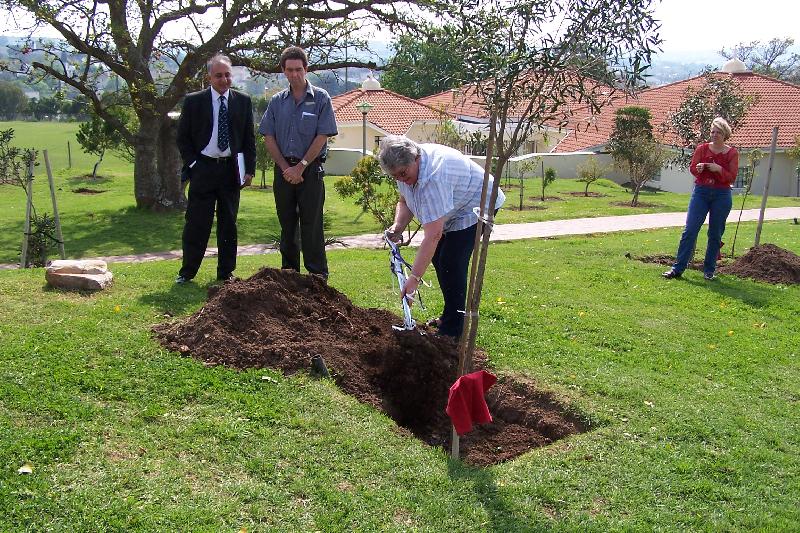
This Makana Enviro-News column (which appeared in Grocott's Mail on Tuesday 25 August) is all about (Indigenous) Trees.
The first week of September is National Arbour Week (Iviki Lezihlahla). Trees use up carbon in the atmosphere and produces oxygen – so we can breathe. And of course, trees provide shelter and shade from the sun, food, fibre, firewood and even create the right conditions for rain to fall!
The aim of Arbour Week is to:
- Promote a better understanding of trees, particularly indigenous trees;
- Highlight the important role trees play in sustainable development and the livelihoods of people and their environment;
- Encourage communities to participate in various greening activities within their own surroundings;
- Raise awareness of South Africa’s urban greening initiatives;
Arbour Week celebrations help highlight the value of planting and caring for indigenous trees in our country. This is especially important for many disadvantaged communities who often live in dry and barren areas. Every year, the Dept of Water and Environmental Affairs features two indigenous trees. This year, there is special focus on the Monkey Thorn (Acacia galpinii) and two rare species – the Tree Fuchsia (Halleria lucida) and the Round-Leaved Teak (Pterocarpus rotundifolius). During this week, Rhodes University plants a variety of indigenous trees in honour of retired staff. What will you plant?
More info: http://www.dwaf.gov.za/events/ArborWeek/ and the South African National Biodiversity Institute's plant information website www.plantzafrica.com
Indigenous Trees - Just Fashion, or the Real Thing?
Is the current buzz of “going indigenous” just something in vogue or are we seeing a national trend? The old fashioned mindset of European gardening is fast being replaced by a refreshing African style that utilizes our local trees, shrubs and bulbs. But the value of trees goes far beyond beautifying the home garden. Travel through most of Africa and you will find people gathering beneath shady trees for meetings, funerals, weddings and even schooling. They are an integral part of that community. In a show of confidence in pursuing a long term goal of greening the Eastern Cape, a wholesale nursery of indigenous trees has been established right here in Grahamstown. Eastern Cape Trees challenge you to join them in the quest for a greener future. You are invited to join them and browse on their Open Day on the 5th September.
Contact Tracy Lindsay of Eastern Cape Trees on: t.lindsay@ru.ac.za or 083 261 9551
Go Indigenous for Arbour Week! Some Advice from BotSoc
Indigenous trees are adapted to local conditions, making their establishment and long-term care easier compared to many exotics. When selecting trees, important considerations include the ultimate tree size, soil and climate preferences, water requirements, their aesthetic values, and proximity to buildings and drains.
As well as providing shade and shelter, trees with nectar-producing flowers and fleshy fruits provide food for birds and insects. Many indigenous trees have traditional uses in the Eastern Cape, e.g. the bark of numerous trees has medicinal properties, and leafy branches of sneezewood (umthathi, Ptaeroxylon obliquum) and wild olive (umnquma, Olea europaea subsp. africana) are important in religious rituals.
Where space permits, coral tree (umsintsi, Erythrina caffra), Cape chestnut (umbhabha, Calodendrum capense) and boerboon (umgxam, Schotia spp.) make beautiful flowering specimens. Wild plum (umgwenye, Harpephyllum caffrum) is fast growing with edible fruits borne in winter and spring. Yellowwoods (umkhoba, Podocarpus spp.) are attractive, but slow-growing trees.
Smaller and easily controlled trees suitable for town gardens include tree fuchsia (umbinza, Halleria lucida), wild pomegranate (umsombutyu, Burchellia bubalina), Gardenia thunbergia (isisende), Bauhinia spp., Kei apple (umqokolo, Dovyalis caffra) and Rhus spp.
For information on local indigenous trees, contact the Albany Branch of the Botanical Society of South Africa (www.botanicalsociety.org.za/branches/branches.php).
An Invitation to a Grand Arbor Week Event!
Makana Municipality in partnership with WESSA, the Environmental Education Sustainability Unit (RU) and the Millennium Tree Planting Project, acting under the auspices of the Makana Environmental Forum request the pleasure of your company at a function to celebrate National Arbor Week. 4 September at the Seventh Day Adventist School in Joza, starting at 10.00.
Contact Kevin Bates: kgb@makana.gov.za Tel. 046 6036072
And Another One - Albany Horticultural & Lilium Society Tree Planting
The Albany Horticultural & Lilium Society will mark Arbour Week by planting two coral trees (Erythrina caffra) at the recently established Grahamstown Child Welfare safe house on Saturday, 5 September. The meeting point is the Albany Museum in Somerset Street at 14:30. Lifts will be provided. Bring along a picnic tea to enjoy in the Makana Botanical Gardens afterwards. All welcome.
Another Reason to Plant Trees (if you need one!)
If you have recently travelled by air to some far-off place and if you’re also trying to decrease your carbon footprint, you may be starting to feel some twinges of conscience ‘sticking on the sole of your shoe’ as Paul Simon would say.
Irene de Moor says the good news is that you can atone for your sins; you can buy your way out OR you can plant tree(s).
To find out about the former, log onto www.climatecare.org and arrange to donate to a carbon sequestration project. This is a reputable site that funds a variety of projects around the world.
If you prefer the other option you can find out how many trees you need to plant by logging onto the ‘Food and Trees for Africa carbon calculator’ http://www.trees.co.za/carboncalculator/index3.php
Irene says that she has just calculated that she and her husband together owe an amount of about R670 for having taken a return trip to Warsaw via Amsterdam. Alternatively, they could plant eight trees. Since they’re broke after their trip, they’re going for the latter option.
Contacts for Makana Enviro-News:
Nikki Köhly: n.kohly@ru.ac.za, 046-636.1643 / Lawrence Sisitka: heilaw@imaginet.co.za, 046-622.8595 / Jenny Gon: j-gon@intekom.co.za, 046-622.5822 / Dan Wylie d.wylie@ru.ac.za, 046-603.8409 / Nick James: nickjames@intekom.co.za, 046-622.5757 / Strato Copteros strato@iafrica.com, 082-785.6403.
